Single Men - The Holy See MMU
- Thread starter unmerged(90806)
- Start date
-
We have updated our Community Code of Conduct. Please read through the new rules for the forum that are an integral part of Paradox Interactive’s User Agreement.
You are using an out of date browser. It may not display this or other websites correctly.
You should upgrade or use an alternative browser.
You should upgrade or use an alternative browser.
The strong Ottomans could be an opportunity... if you could get Austria to fight them in a series of wars it would deal with two annoyances with one stone 
I hope you are just temporarily busy, I imagine putting together the next update for a 20 year Pope will not be very straightforward. Looking forward to it, once it's ready.
I hope you are just temporarily busy, I imagine putting together the next update for a 20 year Pope will not be very straightforward. Looking forward to it, once it's ready.
This AAR is well worth reading! I'm only beginning it now, but it looks very promising.
So I know I'm quite late here, but I just wanted to point out something significant: I wrote in a decision for the Papal States that allows a human player to automatically seize control of the Papacy. You have to re-enact the decision every time a new pope is elected, but doing this will allow you to see the decisions that go into the Catholic Church - you will get to decide church policy, judge ecclesiastical law, call crusades, and more. It's a bit game-breaking in some ways, though - it lets you decide the fate of the church in a way that historically would have been impossible.
Also, since you asked, the difference between the pious, secular and corrupt popes is mostly trivial to the Papal States, but critical to events in Christian Europe. Other than the modifiers you get and some relations bonuses/penalties with other countries, you won't notice anything. However, behind the scenes, pious popes make church corruption events rarer and the AI Papal Controller is more likely to make decisions that are based on faith, not greed. Reverse this trend for corrupt popes. Which kinds of popes dominate the 15th century will affect how far and how fast the Reformation spreads, and what kinds of popes dominate the 16th century will affect the church's response to the Reformation.
So I know I'm quite late here, but I just wanted to point out something significant: I wrote in a decision for the Papal States that allows a human player to automatically seize control of the Papacy. You have to re-enact the decision every time a new pope is elected, but doing this will allow you to see the decisions that go into the Catholic Church - you will get to decide church policy, judge ecclesiastical law, call crusades, and more. It's a bit game-breaking in some ways, though - it lets you decide the fate of the church in a way that historically would have been impossible.
Also, since you asked, the difference between the pious, secular and corrupt popes is mostly trivial to the Papal States, but critical to events in Christian Europe. Other than the modifiers you get and some relations bonuses/penalties with other countries, you won't notice anything. However, behind the scenes, pious popes make church corruption events rarer and the AI Papal Controller is more likely to make decisions that are based on faith, not greed. Reverse this trend for corrupt popes. Which kinds of popes dominate the 15th century will affect how far and how fast the Reformation spreads, and what kinds of popes dominate the 16th century will affect the church's response to the Reformation.
Willum:

Kroisistan & Marco Oliverio: The update is coming.
aldriq:
dharper:
If you follow, you'll see I had a schism as well. And here I have a question. It did get resolved somehow diplomatically/peacefully and as a result I got the former anti-Pope's province for free (I mean it became part of the Papal States). No event to give it back to the formenr owner fired, is that WAD? (Or should I have waited a bit longer?)
As you see I followed your advice.However much I would like to see a new update, do not feel obliged to make one, and under no circumstances are you allowed (yes, allowed) to make one at any other time, than at your leisure.
Sorry, I sort of felt if I am to keep on going with this, only one update on a Pope with such stats: 3-3-3. :angry:That being said, I would prefer to see a pope lasting twenty years split into two updates, so that his deeds may be fully described in all their glory or horror, as the case may be.
Kroisistan & Marco Oliverio: The update is coming.
aldriq:
Sadly, there's been very little animosity between the two.The strong Ottomans could be an opportunity... if you could get Austria to fight them in a series of wars it would deal with two annoyances with one stone
dharper:
Thanks for the praise. To a large extent this aar is a homage to the excellent job your Dei Gratia is.This AAR is well worth reading! I'm only beginning it now, but it looks very promising.
I used it as you'll see if you carry on reading. It costs stability!I wrote in a decision for the Papal States that allows a human player to automatically seize control of the Papacy. You have to re-enact the decision every time a new pope is elected, but doing this will allow you to see the decisions that go into the Catholic Church - you will get to decide church policy, judge ecclesiastical law, call crusades, and more.
I don't think so. Truth is, as I did enact this decision at the crucial time, I got to decide how to go about the threat of the Reformation though. As for excomunications, I did excommunicate France, and it had a very hard time, but frankly there were so much more factors to tear the le Blob apart... (My excommunication of Sweden did not have such a dramatic effect.) There seems to have been a crusade thing as well. But I'm positive I did not call one. Now I think the Emperor's engagement might be due to Helius's OE-Empire SRI stuff.It's a bit game-breaking in some ways, though - it lets you decide the fate of the church in a way that historically would have been impossible.
Interesting to know. I might have messed up things here, as for a pretty long time I acted as the Papal Controler, either through 'Take Control of the Church' decision, or through becoming one 'naturally', or through getting no-conclave Popes (at which instance the PC doesn't change, a bug?)Also, since you asked, the difference between the pious, secular and corrupt popes is mostly trivial to the Papal States, but critical to events in Christian Europe.
If you follow, you'll see I had a schism as well. And here I have a question. It did get resolved somehow diplomatically/peacefully and as a result I got the former anti-Pope's province for free (I mean it became part of the Papal States). No event to give it back to the formenr owner fired, is that WAD? (Or should I have waited a bit longer?)
CLEMENS IX
23 April 1627 - 5 August 1646
UT SEMENTEM FECERIS ITA METES
The Bumpkin
Tired of the growing influence of the Ludovisi family, the Emperor, Václav V made sure the papal throne would go to someone who would feel suitably grateful to him and who would not make waves. It took some time to bribe the electors, but eventually a Taddeo Barberini was chosen; an ecclesiastic without any aristocratic ancestry and with little renown among his peers. Thoroughly indebted to the Emperor, crowned as Clemens IX in April 1427, he soon proved to be exactly what Václav V had wanted.
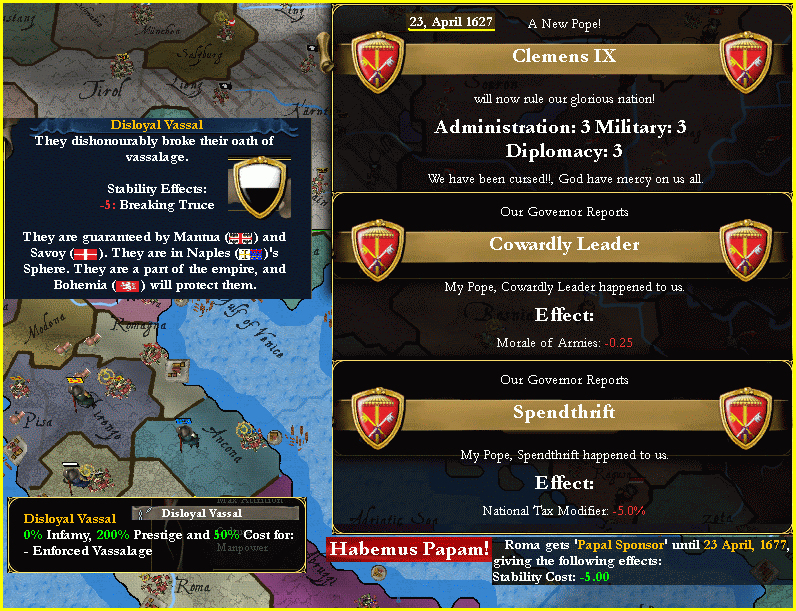
As Václav V had second thoughts on the whole Congress concept, the new Pontiff, obligingly, did not pursue the matter further. Thus Innocentius VIII’s life work and a few-month effort of numerous diplomats boiled down to nothing. A few bilateral agreements remained in force but the grand scheme, the illustrious Innocentius VIII had put forward, petered out. The Emperor also opposed any form of Papal supervision in the northern Italy, which he deemed was his own Imperial turf. As a result Clemens IX on the day of his elevation recognised Siena’s independence and ultimately relinquished Papal claims on Modena. Throughout his reign he had to put up with the unruly northern princes of Milan and Ferrara as well as the Archbishop of Tuscany turning to Imperial judgment in any even the most trivial thing that was not to their liking. Here Clemens IX displayed his prime characteristic: ‘Concede, concede, concede; but always ask for something in return.’
It is somehow ironic that with this utterly incompetent niggard at the helm the Papal States did not fall apart, and in fact in some areas, after twenty years of his rule, they throve. Clemens IX, a hopeless spender and an inept administrator, left the Papal coffers overflowing. A far cry from a soldier or a strategist, Clemens IX lost wars gracefully, with minimal losses and the acquisitions which were made during his pontificate well made up for the defeats. Whether he, an upstart in diplomacy, managed to strengthen Rome’s international position and advance the matter of True Faith is questionable. No doubt though he was the first Pope in ages to dramatically alter the Papal policies. He ascended the throne as the Emperor’s lapdog, he died fighting the Emperor. (curses, I got this 3-3-3 wonder, hoped he’d pass away soon, but just my luck he stuck for almost 20 years; 20 years of vassal trouble; but how come he made me rich? for one thing: with 3ADM and 3MIL I cannot build any MM buildings so there weren’t that many layouts, more importantly war subsidies – from most surprising sponsors - made me really rich, this mechanic needs overhauling; the map of Europe shows Brandenburg partially restored, it regained its cores too, and Austria still in internal strife)
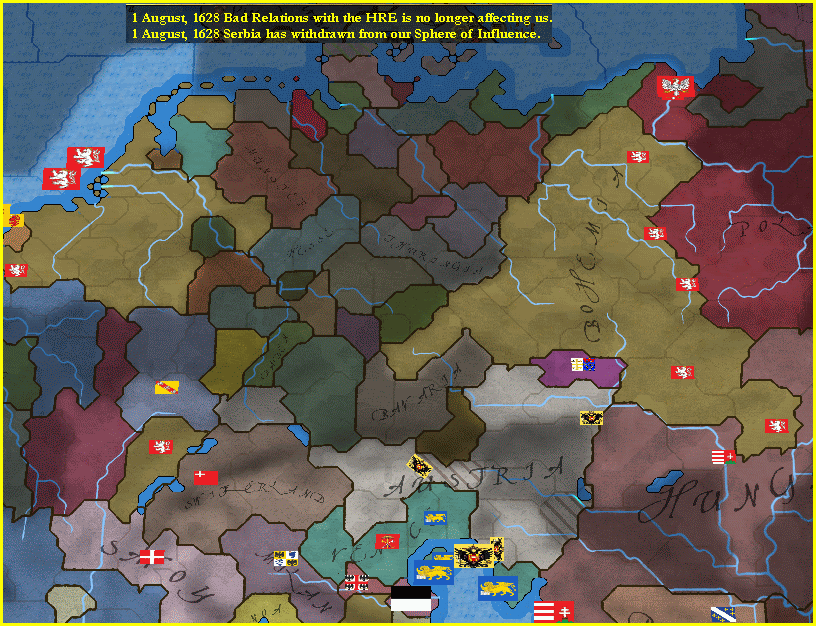
The Calamity Magnet
All Clemens IX hoped for was world peace, so that he could take pleasure in his luxurious life in Papal palaces and gardens. And in fact he avoided conflicts, but as he could do nothing about commitments made by his predecessors, peace he would not enjoy. When the series of wars over Ragusa broke out, Clemens IX, well-read on astrology and popular prophesies, was not surprised as it says in the ambiguous Les Propheties by Nostradamus that a town in the Balkan region will be a powder keg that will ignite the whole Europe.
In January 1629 the Ottomans invaded Ragusa; Clemens IX did not hesitate to help the small maritime republic against the worryingly growing power of the Turks. Together with Václav V he created a coalition of Christian countries to stave off the infidel’s advance. The war effort was sponsored by the court in Madrid. Lavish gifts were sent to Rome by various vying parties from civil-war-torn Spain with the aim of trying to win Papal favours and recognition of claims to the throne. Clemens IX naturally accepted the gifts from all the concerned, never clearly stating who was in the right. (As both Bohemia and Venice rushed to Ragusa’s rescue I opened up my own conflict, and yet proved militarily incompetent, but there’s no chance OE could stop this tide; you can see the war subsidies from civil-war-torn Spain, quite a large sum, I guess such extravagant expenditures sped up the civil war turmoil there and did not help with two regency wars later, throughout Clemens IX’s reign Spain was a non-issue in European politics; btw I also got substantial subsidies from Protestant England(?!), lost the pic though)
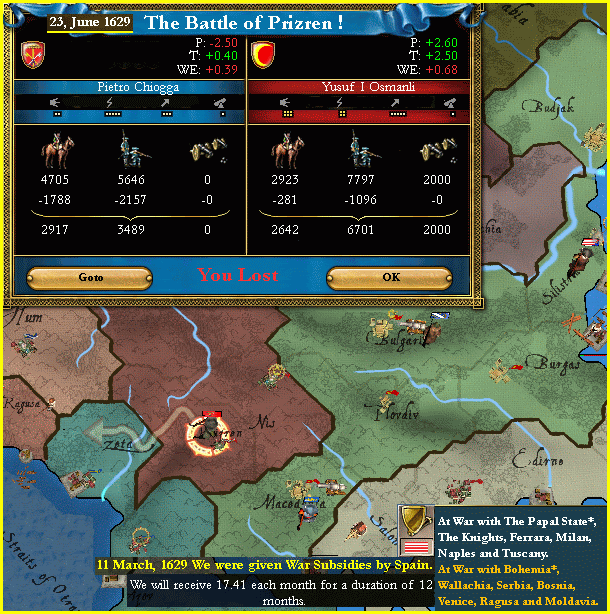
Three years later, as soon as the Turk seemed contained and humiliated, and the final blow was being planned, the treacherous Joseph I of Austria attacked Ragusa. Hurriedly, Rome agreed on rather mild terms with the Sultan. Foe turned friend, one of the peace conditions actually was the promise that Muslim privateers, using the Papal States’ ports would disrupt the enemy supply lanes and share the plunder with the Holy See. Never was Clemens IX averse to a chance of making some easy money.
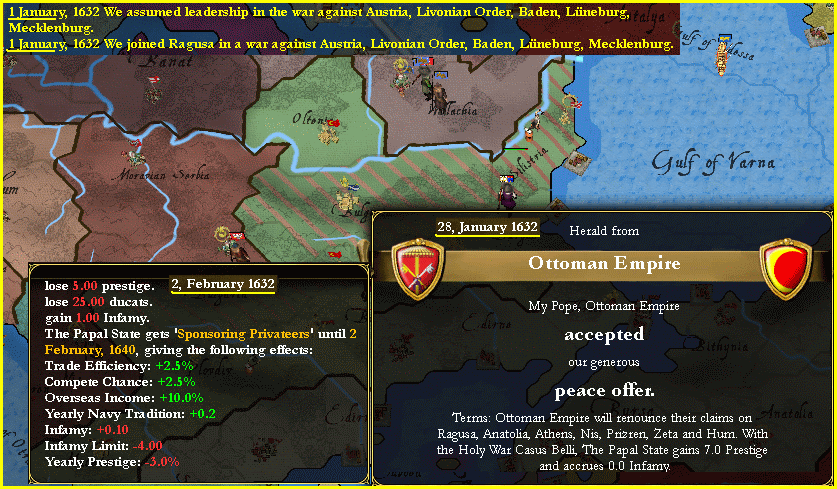
Three years later Joseph I was brutally made to realise he had miscalculated. The Archduke lost Lienz to Venice and when yet once again Papal forces captured Wien he was made to recognise this fact as well as ceding in perpetuity the Ostmarch area to the Neapolitan dynasty. This territory might be re-joined with Austria should the Montoros inherit Wien; not so unlikely as the succession crisis in Austria was far from over. (what can I say, that’s as much as I can hurt Austria; I’m happy Venice asked for a province, imo Triest would be a more logical demand though; I admit there’s a déjà vu thing about it, and it’s pbly the first time I’m happy Austria AI is so helplessly hooked on Ragusa as it let me so cleanly rid them of their cores)
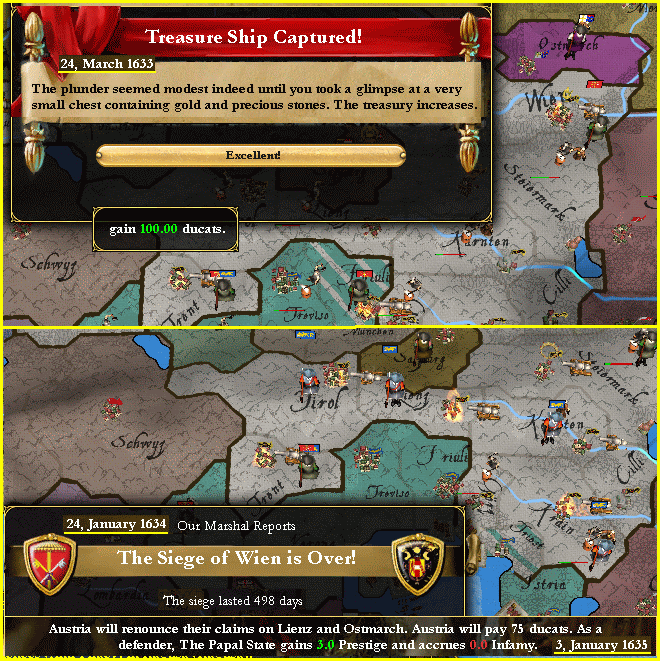
Slipping into Madness?
In Prague popular gossip said there was a curse put on the title of the Duke of Modena and one would never go South to claim his land. The title, long ago contested between the Pope and the Emperor, was supposed to go to Václav V’s heir. But the tragedies struck the Bohemian court in quick succession. First in 1631 the older of the two Emperor’s sons died suddenly of the mysterious sweating sickness, barely a few months after his betrothal an a couple of weeks before his sixteenth birthday. Two and a half years later, when the other of the two boys was about the same age and campaigning with his father in the Balkans, apparently by mistake, Václav V shot him dead. This lead to a succession crisis in Bohemia as the closest in kin and presumably next in line was the Emperor’s much younger half-brother, the Protestant-turned Karl II Ludwig of the Palatinate.
Never a brilliant diplomat, and now touchy and dejected by the string of personal mishaps, Václav V made a diplomatic blunder. When he attacked Károly III of Hungary he did not invoke international treaties and acted as if he desired to madly avenge his son’s death. Officially, the war was later claimed an act of intervention against the annexation of Moldavia into Hungary, but that’s not how the European courts saw it, even though the Holy See went into trouble to invest some money into clearing the Emperor’s name. The war with Hungary was easily won, but it marked the beginning of the downward spiral the Bohemian crown was slipping into.
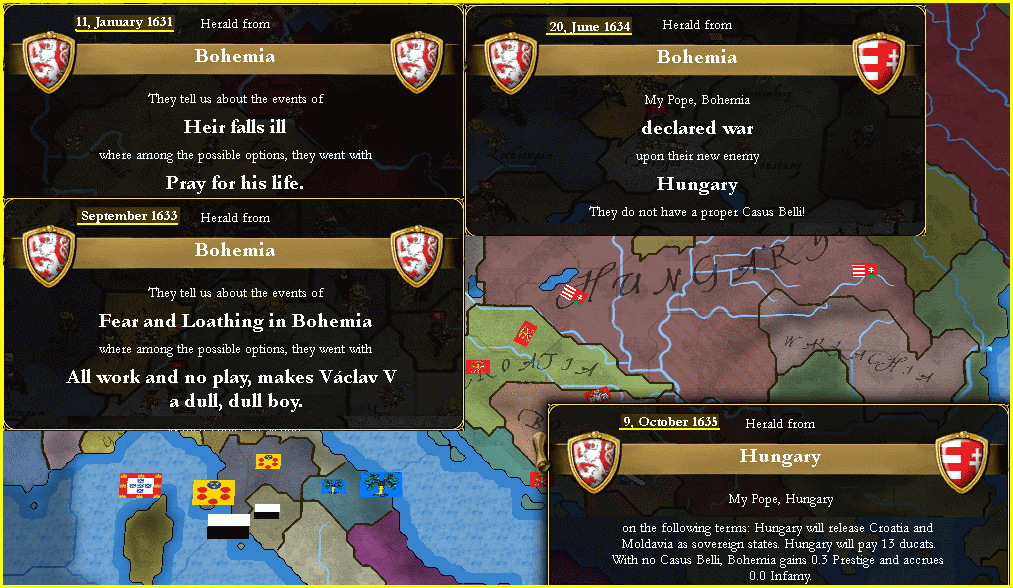
Sensing Václav V’s weakness Poland-Denmark and Bavaria attacked Bohemia; they brought along Portugal, and Spain with England respectively. Naturally, Clemens IX assisted the Emperor, but neither wanted nor could do much to help. Rome had quite a few things on to deal with closer to home. Since yet another vulture, Bosnia, had attacked Ragusa, backed up by the former Papal satellite, Trebizond. Both had to be shown where their place was. Also, the marriage union between England and Brittany ended up in the merging the two, once again England had foothold on the continent. Instantly, France attacked England, the long inconclusive war was of little interest to the Pope as both belligerents were heretics; the fate of Catholics living in the former Duchy of Brittany was rarely mentioned. (what can I say, Ragusa is really a sort of magnet; as for heirless Bohemia, as soon as I saw the PU with the Palatinate was in the making, I decided to go for it and intervened a few times, namely, I killed off any new spawned heirs for Bohemia; I mean in reality it was not that easy to get rid of your wife: see the length of trouble Henry VIII of England had to go through, and still a male heir was not guaranteed; it irks me the way the game just pops out an heir out of thin air; also in real life the courts of Europe would be aware of the imminent succession crisis and would act upon it, formed blocks; as regards Václav V’s diplomatic blunder, he’s a 3DIP 5ADM 3MIL ruler, imagine him and my current Pope the pair of them shaping Europe!))
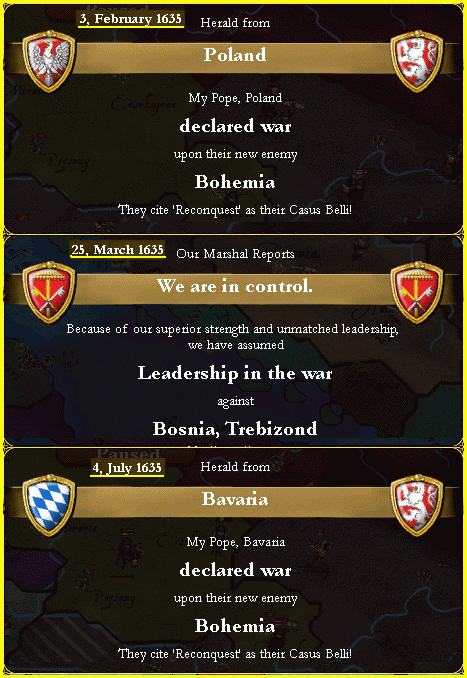
Method in this Madness?
While the effort of the Papal military was entirely focused on dealing with Bosnia and Trebizond, Václav V found it gradually harder and harder to stave off so many enemies. Both Rome and Prague proved slow to understand that these wars would change the balance of power in Europe dramatically. When it seemed not everything was lost and Bavaria agreed to the status quo terms, the perennial enemy within the Imperial holdings reared its head again: the heretics. The Low Lands were in turmoil again and the Protestant Duke of Burgundy refused to send his men to put down the revolts; actually he dared to cut his allegiances to ‘the Emperor who tramples on religious freedoms of his own people.’ Truth to be told, Václav V had encouraged numerous Jesuit missions in Dutch cities, violating the resolutions of the Congress of Prague which endorsed freedom of confession in the Low Lands; and had thus lit the fuse.
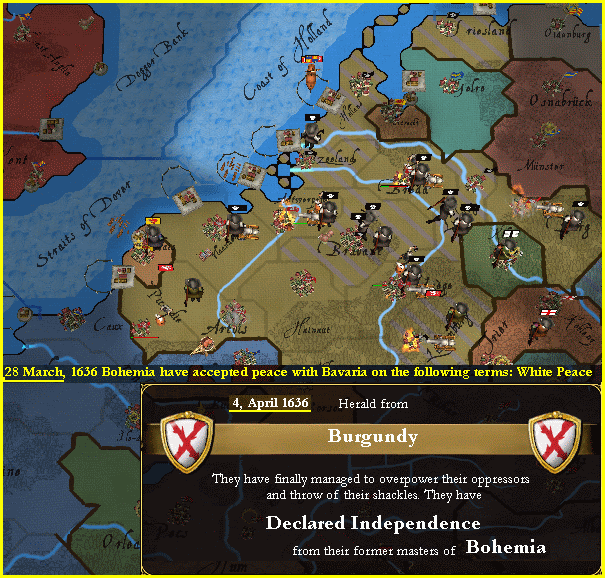
The war was not going well for Václav V. Even though he seemed to be holding his ground against the Poles, the Danes occupied the lands of his now sole vassal the Margrave of Brandenburg, a heretic whose loyalty was by each day more and more uncertain. Sensing the Emperor’s weakness, various minor princes of the Empire got down to settling their own particular scores. The decades-long peaceful Empire was peaceful no more; shockingly the bad example was set by the Emperor’s half-brother, Karl II Ludwig of the Palatinate, who took a chance to incorporate Mainz. The demise of the Archbishopric-Electorate sent shock waves throughout the Empire: was it free-for-all?
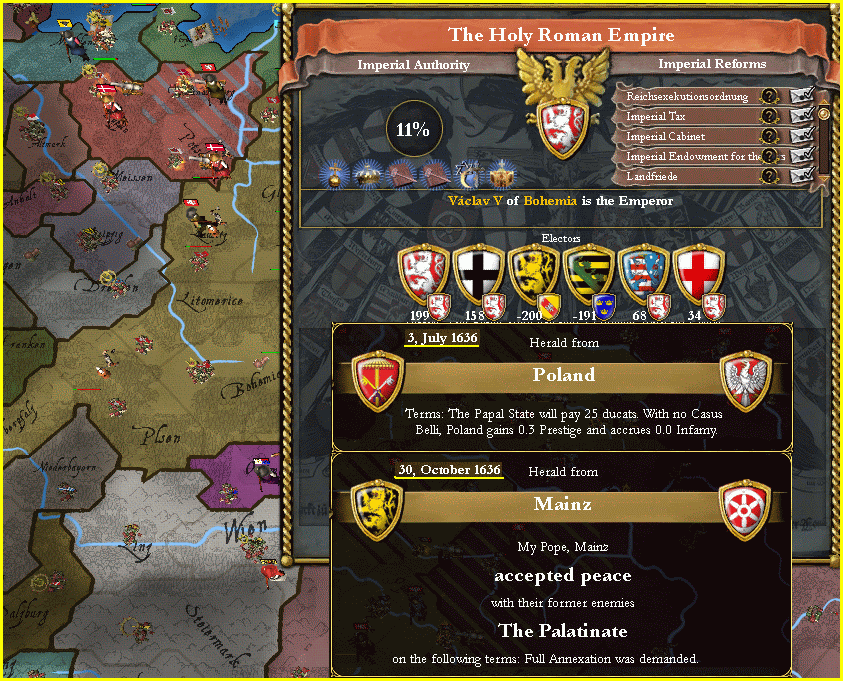
When Clemens IX withdrew from the conflict, it was like sealing Václav V’s fate. Defeated, he had to accept humiliating terms. Stefan I of Poland-Denmark wanted the message to be heard throughout the continent: the Emperor was nothing like the second incarnation of Charlemagne, but merely an administrator and peace-keeper over German lands, a task at which he miserably failed. Bohemia had to give back not only Polish provinces of Poznań and Kalisz. To make it clear what he thought about Václav V’s pretentions and the old-time Emperor-Pope coalition Stefan I demanded Raciborskie as well, the very seat of the Council of Racibórz; this was also an obvious hint for Rome to reconsider its alliance. Finally, in a bit surprising move the free Luxemburg was established, unclear whether it was to remind Václav V Vrestovsky of the other once powerful Bohemian ruling house’s humble beginnings or to create a holding for Stefan I’s bastard.
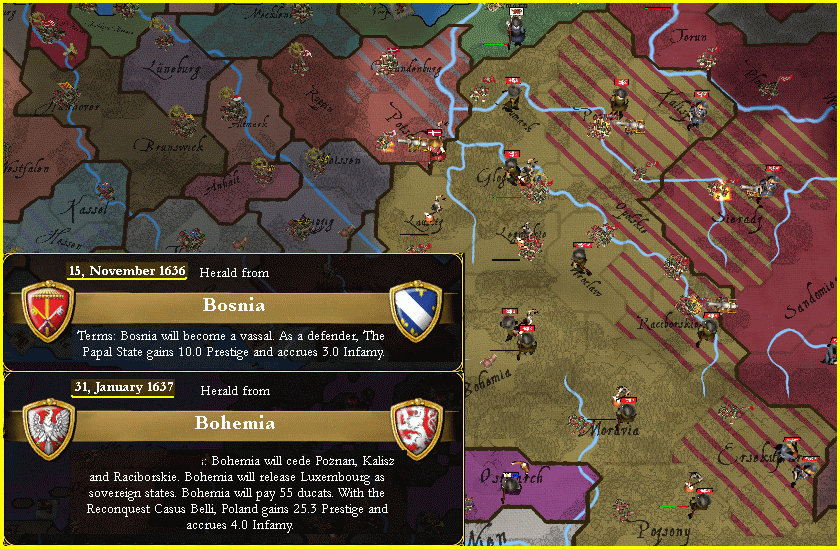
Small wonder, back in Prague, at a first possible opportunity Václav V snubbed the Polish king and refused his illegitimate son’s petition to become a convener. Clearly, it was petty of him, but it illustrates the mental state Václav V was in and how unfit he was at that time to deal with really grave matters: the uprising in the Low Lands, the succession crisis, his insatiable half-brother, the blow to imperial prestige that his Mainz annexation was, the question how to go about choosing the new elector; and, most disturbingly for Clemens IX, yet another threat of schism. (as there are ‘Jesuit activity’ modifiers in two Dutch provinces, as well as various orders all over them no wander the Protestants rebelled; shouldn’t AI act more consistently, I mean as the Empire tolerates all confessions the missionary activity should be drastically limited; the Polish-Danish union proves quite mighty, these two nicely complement one another; at the beginning it seemed Bohemian superior troops would win, and pbly would have won against Poland alone; I don’t think I could have made much difference there, and my troops really were needed elsewhere; the vassalisation of Bosnia made my vassal management a headache, but how could I know Clemens IX was in shape good enough to live another decade)
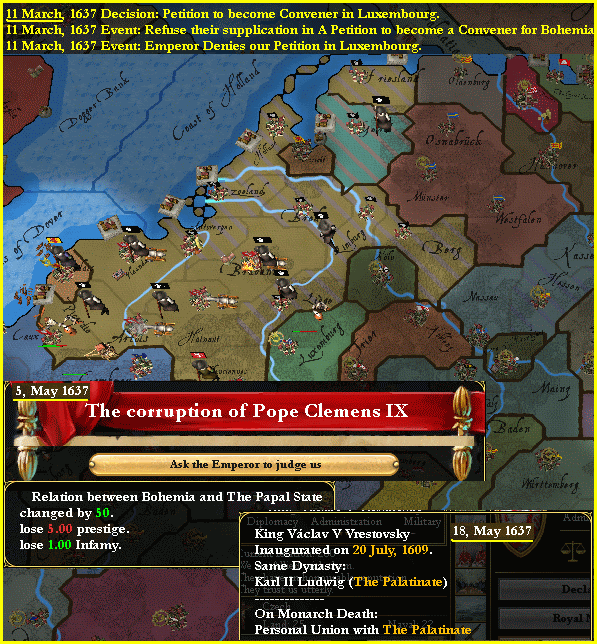
The Adventuters
Clemens IX practiced nepotism and favouritism on a grand scale. His family were enormously enriched by him, so that it seemed as if he were establishing a dynasty. But at the same time a title, sinecure, lucrative post within the administration of the Church, even a cardinal’s hat, could be easily bought, at the right price of course, some claimed Clemens IX had a written price list. This together with gifts from foreign courts and the thriving economy in the East ensured a healthy budget.
Since the first acquisitions in the Levant the stories of riches of the Orient attracted adventurers. For many Pope Alexander VII was one of them and almost forty years after his disappearance his was no longer a tale about a madman but more a myth about a journey of discovery in search of the land of plenty. Clemens IX, by no means an adventurer himself, could not resist a chance for a bit of looting and easy pickings. When after some tension along the borders Genoa got involved in a war with the disjoined Mameluk statelets, the Pope encouraged an intervention lest all the plunder be claimed by others.
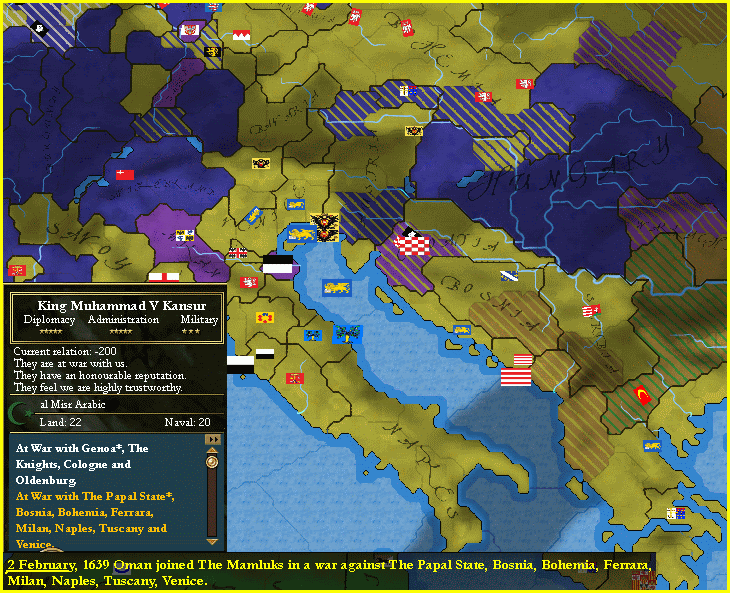
The news from the East took time to reach Rome, and when it did, Rome was preoccupied with completely different endeavours as if the eastern operation had been clean forgotten. Despite numerous setbacks and defeats while fighting in the unfamiliar surroundings against the enemy who used hit-and-run tactics, the Christians managed to take control of the most important cities, and the crowning of the venture was Cairo itself. Later still, the Curia learned Genoa had obtained a distant outpost out of this conflict and the Turks had come to pick the leftovers. (some game mechanics are really odd, I was about to abandon the war disheartened by fighting against Najd (attrition!) and I checked the peace options – surprise, surprise – I can ask for Cairo, the Mameluk capital, only because Najd is the alliance leader, who would say no? actually going into this war I only wanted to help Genoa, hoping they’d grab something and maybe reduce the Mameluks to opm and then… but as it is I got all one could possibly want (for only 4 infamy at that); the rest is for the OE to take now, in a decade or so)
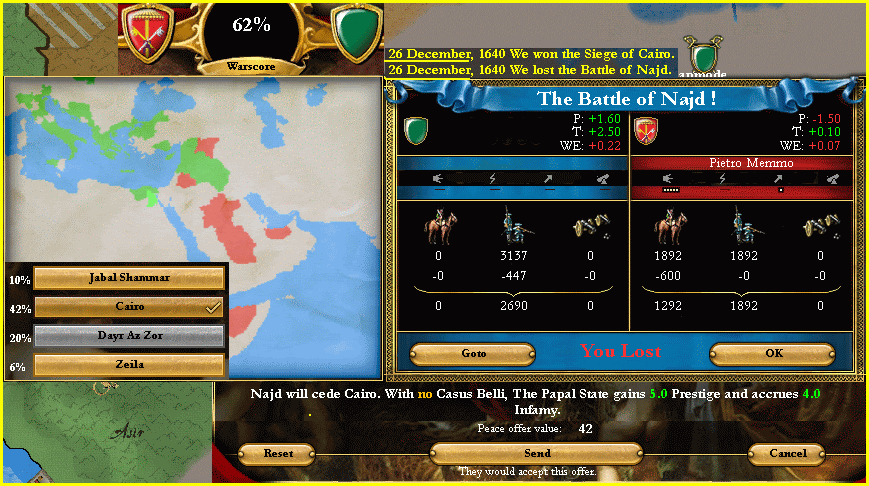
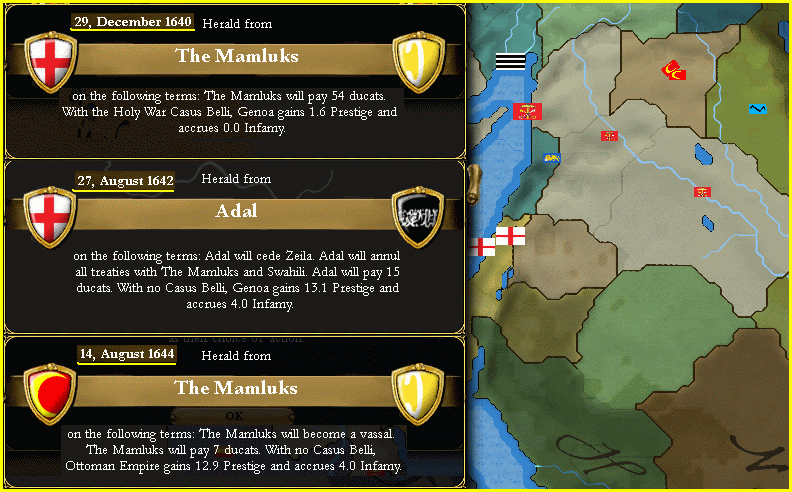
But not all tidings from the East were good. First of all, one of the results of the Papal conflict with Trebizond was the growing hostility between the neighbours; David IV forced the Patriarch of Van to seek a friend closer: the former Papal dependency became an ally of the rival. Mutual accusations severed the bond with the Knights as well; the Order suggested Rome’s actions in the East were only about pillage and accumulating wealth, Clemens IX responded with allegations of heretical leanings. Suddenly, the Papal States had no friends in the East. (I smell trouble, QK won’t wait too long to take advantage of these new opportunities, still I’m not afraid of my fair weather (ex-)friends, none of them is strong enough to pose threat; handing over some land to any of them now is out of the question)
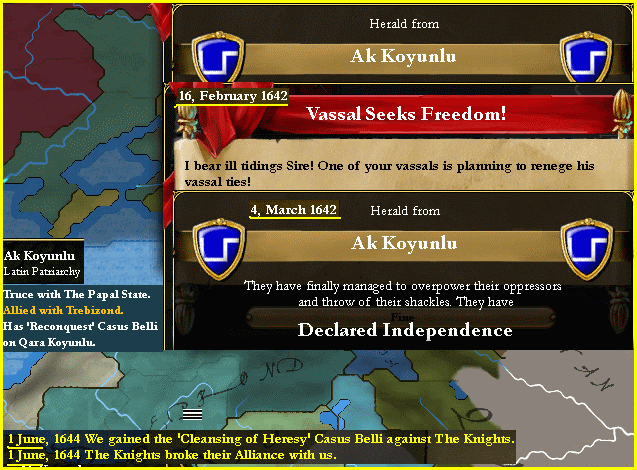
To Recuperate a Little
To take waters, that is what the official statement was, at Acqui Terme the secret meeting was held. For Clemens IX the threat of the schism was a burning issue, but politically the question of alliance with the Emperor was probably even more important. Václav V realised he was getting old and he had to sort out the succession to both Imperial and Bohemian thrones. That is why an undercover guest joined them, Karl II Ludwig of the Palatinate.
It is believed it was him who pointed out that the recent wars had little to do with religious fervour, it was Catholic powers attacking Václav V, and at the same time big Protestant ones, France and England, were at each other’s throats. He argued this proved European politics was past the religious division phase and entered the era of political interests. He even mentioned the Papal States’ involvement, and Clemens IX’s aims at that, were less about the restoration of Catholicism in Europe and more about adjusting the balance of powers to advance Rome’s temporal authority; obviously the hint was he could well succeed Václav V.
The Emperor made Clemens IX see Karl II Ludwig’s accession as inevitable, the toleration policy in the Empire was invoked. The Pontiff let the Emperor buy him, dearly. First of all he demanded the new electorate, Wurzburg, to go to his nephew Antonio, Václav V had to proclaim Clemens IX the only legitimate Pope, thus obviating the danger of the schism, also some good-will gifts in the form of works of art and more positions for the Pontiff’s friends and relations were not sneered at.
Together then, the Pope and the Emperor presented their conditions to Karl II Ludwig. The Bohemian throne appeared easier to secure. The Margrave had to take an oath to respect traditional Bohemian liberties and the laws on religious freedom. More importantly for Clemens IX, he promised, on the event of coming to the Bohemian throne, to permanently renounce Protestantism.
The Imperial crown was not that easy to secure as the majority in the electoral collage was uncertain. True, there were three sure votes: Bohemia and The Palatinate, that is Karl II Ludwig himself, the Protestant Saxony was the third which might be counted on. Here Clemens IX could provide the decisive voice, that of his nephew the prospective Bishop-Elector of Wurzburg. Again though, he would do nothing for free. Karl II Ludwig assured he would abide by Imperial laws, continue the friendship and alliance with His Holiness, recognise Venice’s acquisitions within the Empire and release Mainz and Modena as independent states. Large sums of money sealed the deal.
These secret preliminary arrangements would have been an appalling abomination for Catholics all over Europe if the information about them had leaked out. The Holy Father contracting with a Protestant Prince to let him grab the crown of the Holy Roman Emperor, the Papal spiritual authority could not go lower that this. And yet that is what happened when in January 1640 Václav V died. As planned Karl II Ludwig inherited Bohemian throne and a few weeks later the electors (two votes his own, two others bought) proclaimed him the new Emperor.
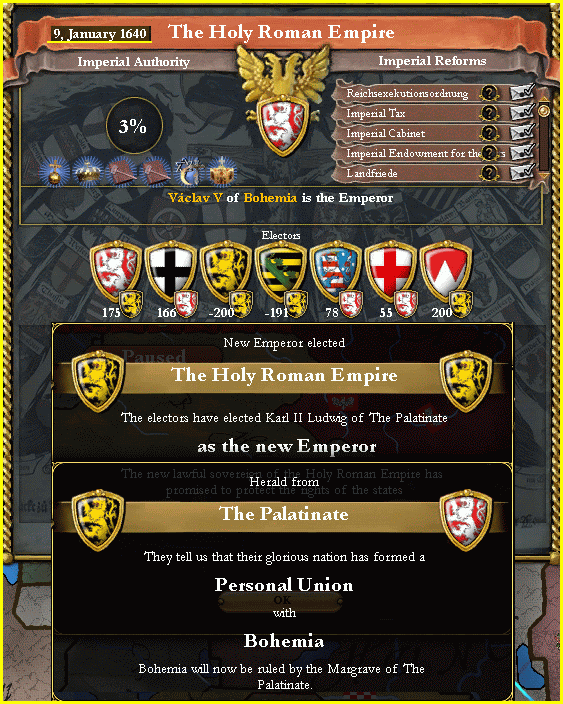
Initially everything seemed to be going smoothly, as planned. There was some commotion in Prague itself and in Catholic communes in the Low Lands, but generally Karl II Ludwig Vrestovsky was recognised. On the grander scale he behaved reasonably. The Archbishopric of Mainz got restored (and went to yet another nephew of the Pope), the Emperor promised to continue his late half-brother’s policy. Signals were sent to those, like Burgundy and Poland, who tried to take advantage of the transition-of-power related instability that the Emperor would not forget any slight. All those tokens of good will as well as flexing muscles bought Karl II Ludwig time to delay the conversion. Other excuses were the strain within his realms or the need to organise a really festive event.
A year later the tensions appeared to have subsided. Karl II Ludwig thus lost a pretext to postpone his conversion. Rome grew restless, Clemens IX feared he had been outsmarted. The truth is Karl II Ludwig himself was walking on thin ice as the majority of his new subjects in the Low Lands welcomed him as a champion of the Protestant Faith. Meeting the expectations of his diverse realms and the Papal States was an impossible task. As a result both his conversion and the renewal of the Emperor-Pope alliance kept on being discussed in dangerously protracting negotiations, Europe froze in a state of limbo. (what happened here is of course cheating/my doing, for more info (reasoning/explanation) I can refer you to a discussion I had with CJL78Nee Emperor Out Of Nowhere)
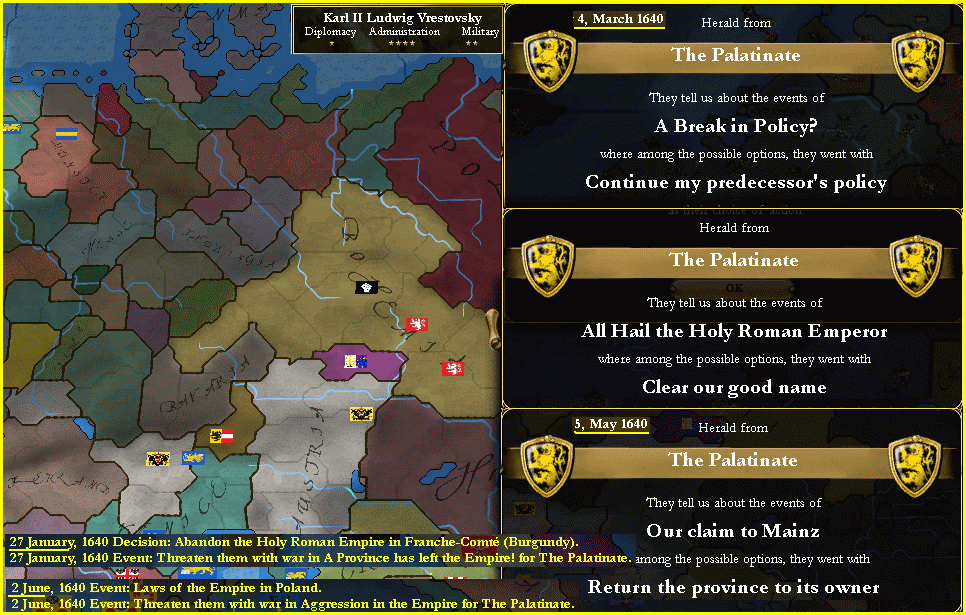
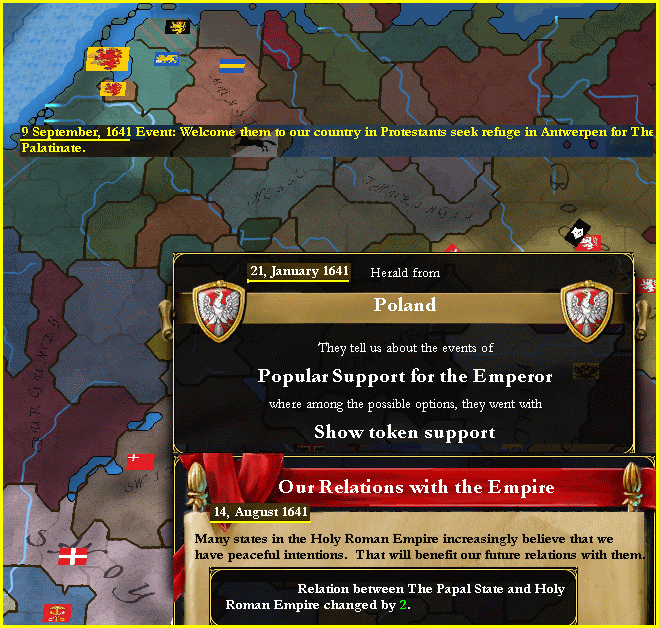
Magnetic Moment
Europe lived in this state of uncertainty as if walking tightrope. The negotiations got bogged down. The parties squabbled about minor issues. Clemens IX demanded the release of Modena, to which the Emperor responded with giving back Neumark to the Protestant Margrave of Brandenburg, and at the same time tried to buy the Pope with gifts. The Pontiff realised Rome had very little real power North of the Alps. And when it seemed some sort of status quo was formed, the magnetic power of attraction intervened, again.
Austria made another attempt to subjugate Ragusa. This landed Archduchy in two wars. Hungary and Venice, together with a bevy of Balkan states rushed to Ragusa’s defense. Clemens IX considered joining the coalition too, but than he saw a window of opportunity to kill two birds with one stone. The Papal States intervened on Ragusa’s behalf and declared war on Austria, bringing along Naples and vassals and facing Sweden and, more importantly, the Emperor, Karl II Ludwig, taking the Austria’s side. As if this conflict was a sort of signal, hostilities were opened on multiple fronts: Poland-Denmark attacked Riga, Trebizond the Knights, Ethiopia Swahili and the northern Germany grew restless again. (Venice engagement, gave me the alliance casus belli; it’s fortunate Naples likes stationing a rather large force in Ostmarch, Wien fell very quickly, and not to me, this time)
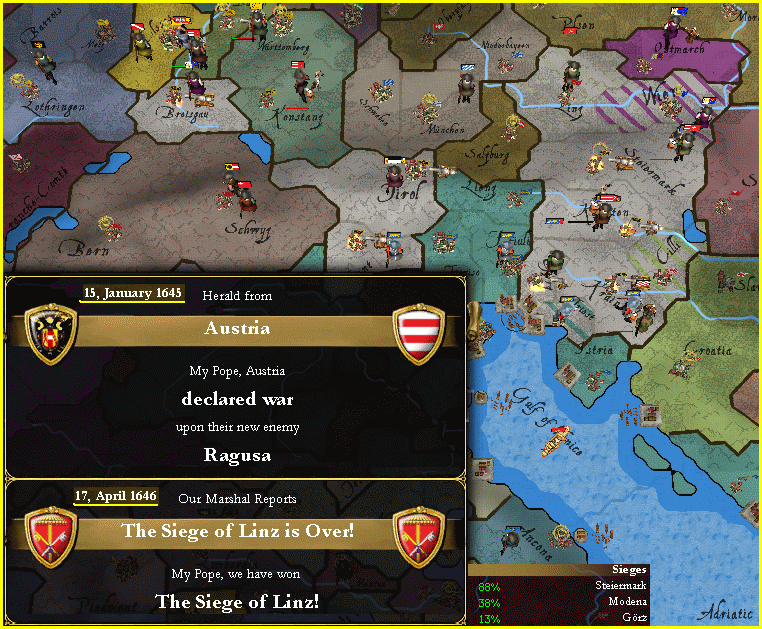
The Papal States’ aim in this conflict was to once again teach Austria a lesson, and hopefully weaken it even further, and to snatch the Duchy of Modena from the Emperor. However, fighting against the Imperial forces was something entirely different than fighting alongside them. Papal troops never excelled on the battlefield, and their glaring inferiority was even more obvious when engaging the proficient military force. In spring the Pope’s closest circle understood the war would have to be quick to have a chance to turn in Papal favour. The mobilisation of Imperial forces was in full swing, and were they let to march South to Italy and Austria, there would be no stopping them. Mercifully, in autumn Clemens IX died, the timing was perfect and the causes natural. (the war against Austria is easy, there are so many helpers, but I stand little chance against Imperial armies; the Palatinate has Military Drill and Battlefield Commissions against my no mil NIs, luckily for me it must have guaranteed Riga or smth and is at war with Poland-Denmark too; which incidentally puts English and Portuguese against each other (80 ships to 111, respectively at Clemens IX’s death); makes me wonder: AI gets so fully engaged in wars started by their allies, wars in which they have nothing to win and very much to lose, e.g. the whole expensive fleet and possibly a few undefended colonies)
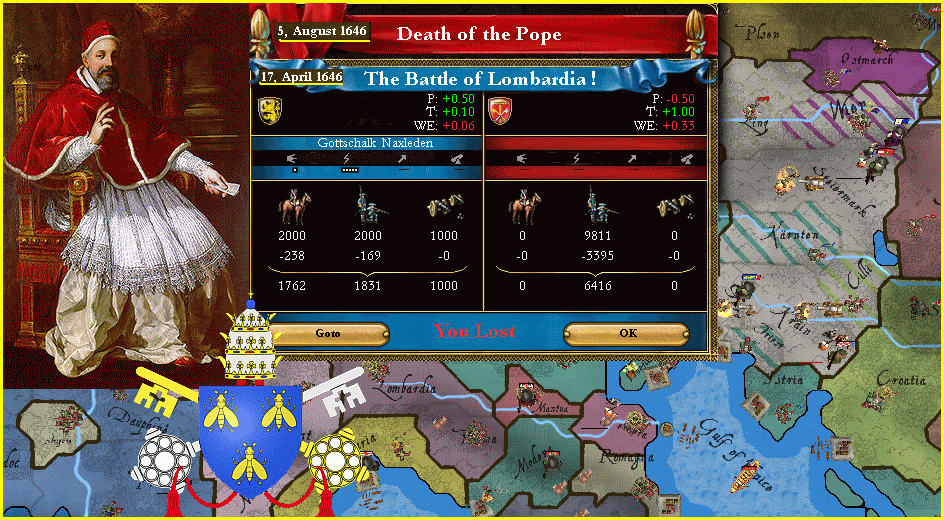
The timely death of the unpopular and incompetent Clemens IX
Treasury / yearly income: 1925,3d / 111,7
Merchants: 4 in Thrace: 39.60/375.02 and 5 in Alexandria: 66.61/504.17
Fleet: 8: 1 early usciere, 3 flytes, 4 cogs
Army: 30k Offensive musketeers; 6k Carabiners
Manpower / discipline: 37.706 / 115.00%
Army / navy tradition: 46.60% / 0.00%
Prestige: 100
Stability: +3
Infamy: 0.00/21.00
War exhaustion: 6.67/24
Gabor, you're back! This AAR is back! :laugh: Ending 2011 like a boss, ain't you?
Magnificent update, I must say, with unneeded wars being fought all over the continent, powers crumbling while other are rejuvanated...
I am very happy for Poland taking back what's theirs, and they are leading a union with Denmark? :huh: I must've missed this happening, or I just can't remember, my grip on the previous events is a bit shaky.
Good to see Bohemia's power lowering, and France and England (no Great Britain?) again at it.
I'm a bit surprised to see you still keep your desert lands in Levant, aren't they a rather big burden on your coffers and military?
Overally, I'm just happy that this AAR is being brought back from dead.
Magnificent update, I must say, with unneeded wars being fought all over the continent, powers crumbling while other are rejuvanated...
I am very happy for Poland taking back what's theirs, and they are leading a union with Denmark? :huh: I must've missed this happening, or I just can't remember, my grip on the previous events is a bit shaky.
Good to see Bohemia's power lowering, and France and England (no Great Britain?) again at it.
I'm a bit surprised to see you still keep your desert lands in Levant, aren't they a rather big burden on your coffers and military?
Overally, I'm just happy that this AAR is being brought back from dead.
A bug, but one that would be quite hard to fix. It doesn't really cause any problems, either, except for flavour, so I've left it. Call me lazy.gabor said:Interesting to know. I might have messed up things here, as for a pretty long time I acted as the Papal Controler, either through 'Take Control of the Church' decision, or through becoming one 'naturally', or through getting no-conclave Popes (at which instance the PC doesn't change, a bug?)
No, that's intentional - it's how the Papal States got Avignon when you start in 1453. I could do something about it, but I had a hard time finding any information about Avignon - I'm not sure how France felt about it, or what steps they took to get it back, or how things might have been different had France not been going through the Hundred Years War at the time. Would they have asked for it back? Demanded it? Bought it back? Declared war to get it back? Would they have risked excommunication? Was it simply a lease that they could stop renewing at any time? I can't find out. I guess I could make it up...I do have some info:If you follow, you'll see I had a schism as well. And here I have a question. It did get resolved somehow diplomatically/peacefully and as a result I got the former anti-Pope's province for free (I mean it became part of the Papal States). No event to give it back to the former owner fired, is that WAD? (Or should I have waited a bit longer?)
Wikipedia said:Successive French rulers sought to annex the region to France. It was invaded by French troops in 1663, 1668 and 1768–74 during disputes between the Crown and the Church. It was also subjected to trade and customs restrictions during the reigns of Louis XIV and Louis XV.
Papal control persisted until 1791, when an unauthorized plebiscite was held and the inhabitants voted for annexation by France. It was subsequently incorporated into the Vaucluse département. The papacy did not, however, recognise this formally until 1814.
Anyway, I have a lot to catch up with in this, so I'll get back to reading.
Wonderful chapter! Reading this was actually one of the first things I did in the new year after returning from a party...
Oh, I smell chaos in there! It should be fun .
.
Oh, I smell chaos in there! It should be fun
Of course it's your luck that you had to get a 3-3-3 long-reigning pope... Though I must say you made the best (mess) of it 
Good to see Bohemia taken down a peg, although I'm not so sure this will really be the end of the monster. And you've got to love protestant England sending you subsidies! :rofl:
Happy new year!
Good to see Bohemia taken down a peg, although I'm not so sure this will really be the end of the monster. And you've got to love protestant England sending you subsidies! :rofl:
Happy new year!
great stuff ... you made a lot out of a rather inept Pope and the ongoing fascination of most of Europe over who controls Ragusa.
this line, though, really stood out:
this line, though, really stood out:
Rome agreed on rather mild terms with the Sultan. Foe turned friend, one of the peace conditions actually was the promise that Muslim privateers, using the Papal States’ ports would disrupt the enemy supply lanes and share the plunder with the Holy See. Never was Clemens IX averse to a chance of making some easy money.
I've read up to 1504 now. Comment time!
I'm impressed with your crusades in Egypt - despite your self-recriminations, I think you had stunning success for a small country, and you resisted temptation along the way.
I'm really enjoying this AAR. I love the pictures! I don't think I've seen an AAR which had such helpful in-game images highlighted and superimposed the way you do, and then combining them with period art - I'm blown away. I was thinking of writing another AAR myself, but I don't know if I can live up to that kind of example!
I also really like how you take unrelated events from the game and weave them into a story. I tend to do the same in my games, and the stories that result are always more interesting to me than simple conquest. You've got a real knack there. At the same time, I also appreciate the white/yellow difference, which makes it easy to figure out just how you've done that.
Finally, I'm impressed that you're clearly paying attention to what's going on in Europe and the Mediterranean, even when it doesn't directly affect you. I have a hard time doing that; I often rely on the log to figure out why something is happening when I come across it instead of noticing it while it's going on.
All in all, a memorable AAR. Some specific replies to comments you made:
The revolter's forces depend on the population revolting. In Egypt's case, there must not have been many Orthodox Christians, but when the same event fires for France's Reformed Christians, it simulates a War of Religion pretty well. Actually, I'm curious to know whether it was an Oriental Orthodox uprising or an Eastern Orthodox uprising - if the former, it should have been bigger. Oh, well.
Looking forward to catching up with the rest soon!
I'm impressed with your crusades in Egypt - despite your self-recriminations, I think you had stunning success for a small country, and you resisted temptation along the way.
I'm really enjoying this AAR. I love the pictures! I don't think I've seen an AAR which had such helpful in-game images highlighted and superimposed the way you do, and then combining them with period art - I'm blown away. I was thinking of writing another AAR myself, but I don't know if I can live up to that kind of example!
I also really like how you take unrelated events from the game and weave them into a story. I tend to do the same in my games, and the stories that result are always more interesting to me than simple conquest. You've got a real knack there. At the same time, I also appreciate the white/yellow difference, which makes it easy to figure out just how you've done that.
Finally, I'm impressed that you're clearly paying attention to what's going on in Europe and the Mediterranean, even when it doesn't directly affect you. I have a hard time doing that; I often rely on the log to figure out why something is happening when I come across it instead of noticing it while it's going on.
All in all, a memorable AAR. Some specific replies to comments you made:
That's a good point; I didn't foresee the possibility that a country allied to the Papal States naturally could become Papal Sponsor. I should be able to fix that, although it's unfortunately not as simple a fix as I'd like, but I ought to be able to do it in an hour or two.gabor said:I do believe that allies obtained through diplomacy and not-Papal-Controller-event-triggered ones shouldn’t desert the Pope.
If you're ever curious about this, you can check your game log - you ought to find several events which describe where the council took place. However, you should also get a tiny relations bonus with the country hosting the council when you hear about it - my way of telling you where to look. If you want to search even closer, the province gets a modifier icon during the council.gabor said:I know all this is part of Dei Gratia by dharper, still I might have missed some parts of the puzzle here, such as where the council took place , many countries got sth like ‘we’ll attend’ event in the period before the council started; I had little to say here as it is the Papal Controller, France in this case, who decides on the options
That's one of my event chains. You were quite lucky; often, countries refuse crusades, and even when they do join in they often do not go to war directly. Having the Holy Roman Emperor do so? Priceless. The crusade goal is a Christian province occupied by infidels, and the crusade hub is where any crusaders go by event.gabor said:was really startled; although the game sees it as a war of aggression I checked the save and it seems I must have called a crusade, there’s a ‘crusade_called’ thing under my TAG, there are also other lines in the save like: ‘crusade_goal’, ‘crusade_hub’ (that's Moravian Serbia prov both), ‘crusade_support/sponsor/refused’; I suspect it is Helius’s or dharpers ‘hidden’ crusade, we shall see how this will play out)
Yes, a number of Papal Sponsor events can influence the innovation/tradition slider of the Papal States or give them the reform friction modifier for a while. You might also notice events like the Dead Hand of the Church which give the Papal States extra cash. On the one hand, I didn't want to spam the player with events notifying them of these changes, but on the other hand, I don't want them to be mystified like you were. I'll see if I can't do something about it, but no promises.gabor said:innovation – tradition slider is now at 0, strange, don’t know why, pbly Church Council affected it, I didn’t touch it
Not much! Getting so many means that you probably had a corrupt pope in office - they tend to get a lot more corruption events, while pious popes get few if any. The Papal States gets a number of modifiers and events giving them free money and prestige, but they also get a number of events costing money and missionaries. It all balances out. In early games, before I did this, I discovered that the Papal States was spending its extra money conquering Italy, pretty consistently. Thus events like papal relations - which are based on historical events.gabor said:I did get three or four ‘papal relations’ with him, which seems a lot for such a short pontificate; what do they do btw?
Why do you think the decision is imbalanced? I'm curious.gabor said:Orthodox uprising is an interesting concept (and effect of a – a bit imbalanced - religious decision I believe) but the revolters’ forces are a joke: 1k!
The revolter's forces depend on the population revolting. In Egypt's case, there must not have been many Orthodox Christians, but when the same event fires for France's Reformed Christians, it simulates a War of Religion pretty well. Actually, I'm curious to know whether it was an Oriental Orthodox uprising or an Eastern Orthodox uprising - if the former, it should have been bigger. Oh, well.
This event is really just foreshadowing. It's based on the real-life case of Erasmus, who did exactly what it says in the event. Many historians believe that his well-meaning work gave new life to demands for church reform and made it possible for people like Luther or Zwingli to reach the masses with their criticisms. Erasmus lived long enough to see the Reformation happen; he remained Catholic until the day he died, and wrote scathing criticisms of Reformation theology. In game, it serves the purpose of being the last requirement for the Reformation event chain to begin. Basically, as soon as you see the New Translation event pop up, you should start planning for the Reformation, one way or the other, and perhaps saving up money and missionaries for conversion or wars during this turbulent period. Or just microwave some popcorn and watch the fun.gabor said:- ‘New translation’ is another Dei Gratia event with unknown to me effects
Hard to say! Church councils are almost invariably good for the church, but not always for the pope. During councils you have the chance to fight church corruption (including the 'papal relations' event!) and, if the Reformation has begun, the chance to begin the Counter-Reformation. Doing this sooner rather than later can help slow down the Reformation, and countries that really want councils can get upset at delays.gabor said:I didn’t call the council as it costs stability and gives penalties, will I regret later?
Looking forward to catching up with the rest soon!
Yay, a bunch of the MMU AARs updated over the holidays! I am happy to see this one continue.
Wow, what a kick in the pants Clement IX was. Every player hates it when Mr. Incompetent also ends up being Mr. Methuselah, but if it's any consolation, I love how you wrote/played in the spirit of those appalling modifiers. Well done.
Good riddance to vassal Ak Konyunlu; they have no way of getting big piles of troops to your European territories, and you aren't (I think) likely to continue expanding in Arabia or Asia; no point in keeping them around.
I don't understand why the AI thinks the world hinges on the fate of Ragusa, but it made for an interesting conflict later on. Speaking of which, I think Austria is fairly well contained—and Bohemia is not. More beatings for Bohemia! (Unless, of course, you want it to continue eating German minors.)
Speaking of which, I think Austria is fairly well contained—and Bohemia is not. More beatings for Bohemia! (Unless, of course, you want it to continue eating German minors.)
Wow, what a kick in the pants Clement IX was. Every player hates it when Mr. Incompetent also ends up being Mr. Methuselah, but if it's any consolation, I love how you wrote/played in the spirit of those appalling modifiers. Well done.
Good riddance to vassal Ak Konyunlu; they have no way of getting big piles of troops to your European territories, and you aren't (I think) likely to continue expanding in Arabia or Asia; no point in keeping them around.
I don't understand why the AI thinks the world hinges on the fate of Ragusa, but it made for an interesting conflict later on.
I just finished reading your account of the Reformation, and well, I just have to comment on some of the things that came up. Sorry if this takes away from the flow of the AAR in any way - I am absolutely stunned at its breadth and scope.
You have had a rather powerful Reformation! Several people have commented on it; without having the game logs in front of me, or save games from just before the Reformation, it's hard to say exactly why things went the way they did, but a couple of salient points:
* Countries near heathens are far more likely to remain Catholic. Ironically, by keeping the Ottoman Empire weak and far from Europe's heartland, you may have encouraged countries like Hungary or Austria to convert!
* Yes, the Papal States conquering does make it more likely for countries to become disgusted at the corruption of the church, but it's a minor effect unless your infamy and size grows to the point where a schism becomes possible. You seem to have avoided that, and your conquests - while growing in number - have been well-chosen so far. I don't think this had a major impact on your Reformation - but I could be wrong.
* One thing I did notice was a number of major excommunications in your game - both England and France, and more I can't recall. While simply excommunicating a ruler does not guarantee that country will convert, it can have an impact if it happens at a critical time. It's possible that this happened in your game.
* Finally, the single biggest factors in the Reformation are church corruption events and distance from Rome/Granada. Countries like Sweden are almost always going to convert because of how long it takes the Renaissance to reach them; there is plenty of time for them to suffer absenteeism, simony, excommunication, and other events. Italy and Spain, on the other hand, nearly never convert, because they don't have time to notice corruption before making their decision. I'm not sure how many of your popes were corrupt and how many were pious, but the impact this has on Christendom can be significant.
And, of course, there are other factors involved that you have no control over - Imperial politics plays a significant role in the Holy Roman Empire, and culture does as well (as part of my attempt to see historical results more often). So, too, does religious fervor, national ideas, and other factors - although all limited in effect. Finally, there's random chance, which can have all kinds of effects! I've seen dozens of Reformations while testing my events, and sometimes you just end up with Protestant Spain and Catholic Sweden.
A second issue that's come up a couple of times: can you avoid a Reformation, or weaken it?
The answer is no and yes. By the time the game begins in 1453 (or 1399, or 1356) the forces that would lead to the Reformation were already in place - the existence of the Lollards, for example, or church corruption, or mistranslations in the Bible, or northern Europe's feeling of alienation from papal conclaves, or the growing issue of centralization of European states under absolute rulers. A confrontation is going to happen no matter what you do, short of an incredibly large number of lucky rolls of the dice.
However, as you can already tell from this post, there are many factors that are within a human pope's control, and it is absolutely possible to have a weak, late Reformation appear. Furthermore, it's possible to combat it as well. As you surmised, compromising with the Protestants more fully could have led to reconversions - although far from all the heretics would be convinced. Even without that, a fast Counter-Reformation can give Catholic countries the tools they need to fight heresy within their borders, and make it more likely that force-converted Protestants stay Catholic for good. With a fast response to the Reformation and some judicious wars in Europe, you can get rid of the Protestant threat.
...But honestly, seeing the scope of the Reformation in your game, I think you ought to keep your expectations lower. Like, a lot lower. The big thing I notice (as of 1527) is that the Holy Roman Empire is in very real danger of becoming dominated by Protestantism. Although it's almost certainly too late for this advice to do you any good, I would focus on keeping the Electors Catholic - many are smaller states where being Force-converted (plus, perhaps, a lucky Jesuit event) could keep them Catholic, and having a majority of the electors Catholic will guarantee you a Catholic Emperor. Helius has put together some events that allow for a historical War of Religion in the empire, but even so - you'll want the emperor on your side if you have any hopes of containing Protestant France, or fighting northern Italy's Reformed states (ouch, by the way - pure bad luck).
A few specific replies:

You have had a rather powerful Reformation! Several people have commented on it; without having the game logs in front of me, or save games from just before the Reformation, it's hard to say exactly why things went the way they did, but a couple of salient points:
* Countries near heathens are far more likely to remain Catholic. Ironically, by keeping the Ottoman Empire weak and far from Europe's heartland, you may have encouraged countries like Hungary or Austria to convert!
* Yes, the Papal States conquering does make it more likely for countries to become disgusted at the corruption of the church, but it's a minor effect unless your infamy and size grows to the point where a schism becomes possible. You seem to have avoided that, and your conquests - while growing in number - have been well-chosen so far. I don't think this had a major impact on your Reformation - but I could be wrong.
* One thing I did notice was a number of major excommunications in your game - both England and France, and more I can't recall. While simply excommunicating a ruler does not guarantee that country will convert, it can have an impact if it happens at a critical time. It's possible that this happened in your game.
* Finally, the single biggest factors in the Reformation are church corruption events and distance from Rome/Granada. Countries like Sweden are almost always going to convert because of how long it takes the Renaissance to reach them; there is plenty of time for them to suffer absenteeism, simony, excommunication, and other events. Italy and Spain, on the other hand, nearly never convert, because they don't have time to notice corruption before making their decision. I'm not sure how many of your popes were corrupt and how many were pious, but the impact this has on Christendom can be significant.
And, of course, there are other factors involved that you have no control over - Imperial politics plays a significant role in the Holy Roman Empire, and culture does as well (as part of my attempt to see historical results more often). So, too, does religious fervor, national ideas, and other factors - although all limited in effect. Finally, there's random chance, which can have all kinds of effects! I've seen dozens of Reformations while testing my events, and sometimes you just end up with Protestant Spain and Catholic Sweden.
A second issue that's come up a couple of times: can you avoid a Reformation, or weaken it?
The answer is no and yes. By the time the game begins in 1453 (or 1399, or 1356) the forces that would lead to the Reformation were already in place - the existence of the Lollards, for example, or church corruption, or mistranslations in the Bible, or northern Europe's feeling of alienation from papal conclaves, or the growing issue of centralization of European states under absolute rulers. A confrontation is going to happen no matter what you do, short of an incredibly large number of lucky rolls of the dice.
However, as you can already tell from this post, there are many factors that are within a human pope's control, and it is absolutely possible to have a weak, late Reformation appear. Furthermore, it's possible to combat it as well. As you surmised, compromising with the Protestants more fully could have led to reconversions - although far from all the heretics would be convinced. Even without that, a fast Counter-Reformation can give Catholic countries the tools they need to fight heresy within their borders, and make it more likely that force-converted Protestants stay Catholic for good. With a fast response to the Reformation and some judicious wars in Europe, you can get rid of the Protestant threat.
...But honestly, seeing the scope of the Reformation in your game, I think you ought to keep your expectations lower. Like, a lot lower. The big thing I notice (as of 1527) is that the Holy Roman Empire is in very real danger of becoming dominated by Protestantism. Although it's almost certainly too late for this advice to do you any good, I would focus on keeping the Electors Catholic - many are smaller states where being Force-converted (plus, perhaps, a lucky Jesuit event) could keep them Catholic, and having a majority of the electors Catholic will guarantee you a Catholic Emperor. Helius has put together some events that allow for a historical War of Religion in the empire, but even so - you'll want the emperor on your side if you have any hopes of containing Protestant France, or fighting northern Italy's Reformed states (ouch, by the way - pure bad luck).
A few specific replies:
Nope, not random, although it does seem that way at times. There are seven automatic excommunicable offenses - most of them pretty obvious, like converting to Protestantism or annexing Roma - and a number of ways the Papal Sponsor can excommunicate enemies or rivals (I once got excommunicated in my game despite being a faithful Catholic, simply because my state was growing too large, too fast).gabor said:As for excommunications, what I love here is that it's (maybe also) up to me or the Papal Controller and not completely random, which I sort of feared it was.
gabor said:gabor: Whether truly swayed by Philipp I’s chivalry and integrity, or seeing it as a last resort to save his empire, Mustafa I converted to Christianity.

Sorry, that's not one of mine! It looks like a vanilla event new to Heir to the Throne.gabor said:gabor: (it’s an interesting event - you can always come across sth new in MM!, what triggers it I dunno)
Large states are unlikely to convert their state religion right away - they recognize the costs involved with having many heretic provinces and choose to wait more often. The spread of Reformation always starts slow - the system is set up like a virus, where is spreads outwards from the source. It can take a while before you start to see countries joining in, but then - as you've seen - it begins to snowball. Very historical in that respect.gabor said:initially the spread of reformation was a trifle, I think there are two reasons for it, the minority system slows it down and the larger the country, the more reluctant it seems to adopt Protestantism as its new religion
I totally missed that; thanks for clarifying. That's a lucky turn of events - be careful, though. The social forces at work in England may still result in the population embracing the Reformation, and without a strong hand, the country could still fall into heresy.gabor said:England did turn Catholic due to the 'Apostasy' event. (I must have written it poorly) So there's still hope.
Last edited:
...Václav V’s diplomatic blunder, he’s a 3DIP 5ADM 3MIL ruler, imagine him and my current Pope the pair of them shaping Europe!))
I had to smile at this but in all honesty the two didn't do too badly, certainly not as badly as I had feared! Whilst 'the Bumpkin' is a fitting title for Clemens he did nonetheless gain Cairo for the Papal States and also get the economy back on track alongside the more personal matter of promoting seemingly near every member of his family to a position of power! Very interesting stuff in Europe, as ever, especially with poor Ragusa. Clemens seems to have picked the most opportune of times to bow out, now that everything seems to be going truly haywire, the next Pope is going to have a tough job on his hands.
It took me a whole day and a bigger part of the morning, but I finally caught up with this awesome aar (posted in it waaaaaaaay back on page 1, no idea why did I stop reading it). Finaly I am able to comment 
I. Byzantophilia or not, moving the capital as soon as you have 5,000 ducats woukd be an increadibly smart move story-wise, if not gamewise. Especially now, when the empire is weak enough to allow this move - if you will be on the furthest province of Europe, the emperor will have massive amounts of trouble controlling you - and getting crowned by the Pope would require a much longer journey...
II. Are the orphans dead (not the original ones of course...) and the pharos policy abandoned perpetually or untill the trouble in Europe stops?
III. Why so much hate for the converted Austria? After all, didn't the bible say "there will be more rejoicing in heaven over one sinner who repents than over ninety-nine righteous persons who do not need to repent"? And on a more temporal level, wouldn't a strong power which keeps Bohemia in check be an asset, not a liability?
IV. I believe the only way to do forced conversions on larger countries is to repeat it as soon as they turn back to their evil ways. There is hope that each time a few provinces will be converted to the one true faith, and they won't have time to re-convert before they geting knocked out again. This is basically what happened in Austria with a good effect, after all.
V. Nepotism FTW! Building strong local dynasties of cardinals will make it much harder for outside powers to controll you
VI. You actually cheated to ensure a protestant emperor ?! :blink:
I. Byzantophilia or not, moving the capital as soon as you have 5,000 ducats woukd be an increadibly smart move story-wise, if not gamewise. Especially now, when the empire is weak enough to allow this move - if you will be on the furthest province of Europe, the emperor will have massive amounts of trouble controlling you - and getting crowned by the Pope would require a much longer journey...
II. Are the orphans dead (not the original ones of course...) and the pharos policy abandoned perpetually or untill the trouble in Europe stops?
III. Why so much hate for the converted Austria? After all, didn't the bible say "there will be more rejoicing in heaven over one sinner who repents than over ninety-nine righteous persons who do not need to repent"? And on a more temporal level, wouldn't a strong power which keeps Bohemia in check be an asset, not a liability?
IV. I believe the only way to do forced conversions on larger countries is to repeat it as soon as they turn back to their evil ways. There is hope that each time a few provinces will be converted to the one true faith, and they won't have time to re-convert before they geting knocked out again. This is basically what happened in Austria with a good effect, after all.
V. Nepotism FTW! Building strong local dynasties of cardinals will make it much harder for outside powers to controll you
VI. You actually cheated to ensure a protestant emperor ?! :blink:
The Bumpkin!:blink:
Still the turmoil continues in the Empire but nice to see that the Papacy still prospered.
Still the turmoil continues in the Empire but nice to see that the Papacy still prospered.
How much more of this is there to read?!? I'm up to 1579. More comments and answers:
Your save game editing is perfectly understandable. The game doesn't always make sensible decisions, and it's entirely possible to end up losing your taste for a game when this happens too often. And, I have to admit, I'm guilty of it myself sometimes - I like the story more than I like the game.
Congratulations on your conversion of Austria - that difficult task is rare, and makes up for losing England once more. Had the Jesuits been founded when England became Catholic? I'm curious, for the sake of balancing events, to know.
Okay, some answers:
On to more, after I come back from giving blood.
Your save game editing is perfectly understandable. The game doesn't always make sensible decisions, and it's entirely possible to end up losing your taste for a game when this happens too often. And, I have to admit, I'm guilty of it myself sometimes - I like the story more than I like the game.
Congratulations on your conversion of Austria - that difficult task is rare, and makes up for losing England once more. Had the Jesuits been founded when England became Catholic? I'm curious, for the sake of balancing events, to know.
Okay, some answers:
Yes, a vanilla one. I like it, but it's unmoddable. It makes sense - you wouldn't want the Ottoman Empire to control the papacy, for example, yet there are games in which they occupy dozens of Catholic provinces. And, in cases like that, those bishops would be less inclined to play political games and more interested in the church. In theory, at least.gabor said:is it some king of mechanism that when a country turns Protestant/Reformed its cardinals support the Papal States?
It unlocks a number of events and decisions which can help the Catholics fight back against Protestantism. Among other things - I _really_ need to advertise this - you now have access to province decisions to send missionaries to neighbouring countries. You also get access to Jesuit events which can convert Protestant and Reformed provinces for free. In theory, a state force-converted to Catholicism is more likely to remain Catholic while the Counter-Reformation is in effect.gabor said:Counter-reformation starts, I never really knew what it meant in gameplay terms
Not exactly intentional, but I don't mind this happening. It can only happen in cases of extremely pious nations with a variety of national ideas and decisions or advisors, and it's hardly unrealistic to assume that you have donations made by faithful worshippers interested in converting heretics and heathens.gabor said:One more thing: a couple of times it happened the cost of sending a missionary was a minus one as a result it earned me a ducat or two!
Not a lot I can do about that, I don't think - but it might be possible to code something into it. I missed where the bastions were - London for one, and where for the other?gabor said:the Holy War thing is part of Dei Gratia, imo it could do with some refining, especially when one of the bastions happens to be in an inaccessible province
A bug, in this case. It's meant to only appear for tribal or nomadic states which are in the process of civilizing. I'm not sure how it happened (or how Ak Koyunlu became an empire) - sometimes the game is a little buggy in this respect.gabor said:also what is Transitional Principality?
It can only fire for countries with colonies of the state religion and homeland provinces that are heretical. Essentially, it moves a heresy from Europe to the New World, and is based on English and French history.gabor said:‘Heretics Emigrate’ thing – it’s the first time I’ve seen it
On to more, after I come back from giving blood.
Palatinate HRE?! cool
Modena - finally going to expand a little bit in Italy, eh?
if you're going to do that, then Urbino must be destroyed
Modena - finally going to expand a little bit in Italy, eh?
if you're going to do that, then Urbino must be destroyed

